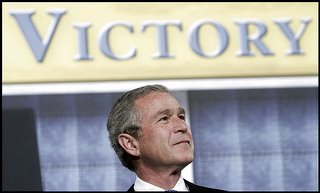Outrage fatigue

My Blog Fodder folder is filling to the brim with links I've been meaning to rant on. But it's all too much lately. So I offer you another link-fest. . .
Festus: Today they have more than 100 battalions operating throughout the country, and our commanders report that the Iraqi forces are serving with increasing effectiveness.
Gen. George Casey, the top U.S. commander in Iraq, told the Senate Armed Services Committee: The number of Iraqi army battalions rated by U.S. officers as capable of fighting without U.S. help had dropped from three to one. Casey said 75 percent of the U.S.-trained Iraqi army was at least capable of engaging in combat, albeit with U.S. troops providing support in most cases. He declined to give an exact breakdown of Iraqi combat readiness, which he said was classified as secret, but he said more than 30 battalions are judged capable of taking the lead in an offensive, with U.S. support. Only one can operate entirely on its own.
I can appreciate that dispensing propaganda is a part of what goes on during war, but this is so sleazy. This report is two years old.
Defence Secretary Donald Rumsfeld has asked a team of lawyers to check the proposals' legality. The Pentagon is forbidden from spreading black propaganda in the American media, but there is nothing to stop an American newspaper picking up a story carried abroad. The Pentagon is well versed in what it calls "psyops", dropping leaflets and using radio broadcasts to undermine enemy morale. But these kind of activities have always been confined to the battlefield, such as Afghanistan. Using covert tactics on media outlets of friendly countries is much more controversial.
Guess they did it anyway. Reports abound that Iraqi newseditors were paid off to publish US friendly propaganda. Were those the stories Bush keeps citing when trying to convince us that things in Iraq are improving? It's hard to know, isn't it?
Here's an update on The Denver Three
White House event staffers unlawfully removed two Denver residents from a town hall discussion with President Bush because of an anti-war bumper sticker on their car, charged the American Civil Liberties Union in a federal lawsuit filed today.
"The government should not be in the business of silencing Americans who are perceived to be critical of certain policy decisions," said ACLU Senior Staff Attorney Chris Hansen, who is the lead counsel in this case. "The president should be willing to be in the same room with people who might disagree with him, especially at a public, taxpayer-funded town hall."
Everyone's favorite batsh*t crazy Uncle Rumsfeld lowers the bar. in Iraq:
Defense Secretary Donald Rumsfeld says you can't judge progress in Iraq based on the number of Americans killed.
Rumsfeld tells students of international studies at Johns Hopkins in Washington that Americans should be optimistic about what's happening. He says people have to stop defining success as "the absence of terrorist attacks."
Speaking of terrorist attacks, the 9/11 Commission came out with it's last report card on how the Federal government has responded to it's recommendations to improve our safty and response to the next terror attack on our shores. The report card is not good, no Gameboy for either Congress or Festus until those guys straighten this out.
After 5 years and unsuccessful lawsuits by the Sierra Club and Judicial Watch, it's finally revealed by leaked Secret Service records of White House security logs that, yes indeed, Oil company executives were granted secret meetings to advise VP Cheney on oil policy prior to Cheneys submission of his Enery Task Force manifesto. But the CEO's are still lying about it:
Toward the end of the hearing, Lautenberg asked the five executives: "Did your company or any representatives of your companies participate in Vice President Cheney's energy task force in 2001?" When there was no response, Lautenberg added: "The meeting . . . "
"No," said Raymond.
"No," said Chevron Chairman David J. O'Reilly.
"We did not, no," Mulva said.
"To be honest, I don't know," said BP America chief executive Ross Pillari, who came to the job in August 2001. "I wasn't here then."
"But your company was here," Lautenberg replied.
"Yes," Pillari said.
Shell Oil president John Hofmeister, who has held his job since earlier this year, answered last. "Not to my knowledge," he said.

<< Home